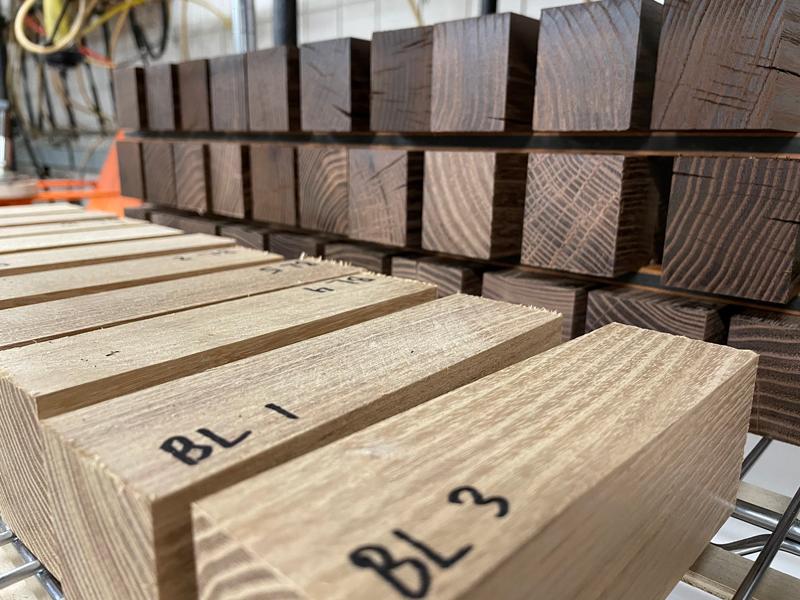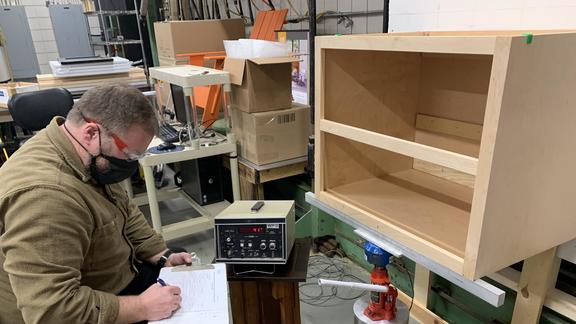
Program Overview
The Advanced Wood Products Program at NRRI aims to develop and commercialize high-performing, sustainable wood-based products and materials from renewable forest resources, while ensuring that resources are used in a sustainable manner with fewer life-cycle impacts than competing and existing materials. Our research leads to new technologies that result in long-term job creation that supports a robust, regional bioeconomy.
Unique Strengths, Expertise and Capabilities
The Program provides professional product, market, and business development services, as well as a robust range of fee-based consulting services that include prototype development, laboratory mechanical and physical performance, field performance testing, process development, and vendor development.
Our expertise is wood thermal modification, advanced mass timber, solid and composite wood products, repurposing of deconstructed building materials, waste reduction and adaptive reuse of materials, materials testing and development, and environmental life-cycle assessment of bio-based materials.
Program Resources
Projects, Partners and Impacts
Using Thermal Modification Technology to Add Value to Small-Diameter Logs
Project Overview
A project in partnership with the U.S. Forest Service Forest Products Laboratory and Michigan Technological University is looking at using thermal modification technology to add value to small-diameter logs from underutilized tree species.
This U.S. Forest Service Wood Innovations project (grant no. 2015-DG-11420004-082) supports forest management needs and enhances the competitiveness of the nation’s forest products industry. The goal is to develop economically-attractive and value-added forest products from low-value and underutilized hazardous woody fuels (such as, balsam fir and eastern hemlock) removed from National Forest System and other public and private lands in Forest Service Region 9.
Specifically, the objectives are to:
- Define product performance benchmarks by identifying mechanical, physical, and biological durability performance targets for the selected thermally modified materials;
- Develop effective thermal modification treatment schedules for each species; and,
- Transfer knowledge concerning performance benchmarks and thermal modification treatments to stakeholders, including those in commercial and other building markets.
This project will advance wood thermal modification technology toward the development of high-performance and sustainable, value-added wood products. This process dramatically improves dimensional stability, resistance to biodeterioration and weathering, extends service-life, and reduces environmental impacts.
Project Publications
Particle size analysis of airborne wood dust produced from sawing thermally modified wood, Aro, M.D., Geerts, S.M., French, S. et al. Eur. J. Wood Prod. (2019) 77: 211.
Project Presentations
Biological Durability of Hygrothermally Modified Hardwoods and Softwoods. Aro, M., Richter, D., Larkin, G., French, S., Keranen, E., and Laks, P. 2017. American Wood Protection Association (AWPA) Annual Meeting. Las Vegas, NV, April 9-11.
Project Progress Reports
Development of a Strategic Marketing Plan for Thermally Modified Timber
About
This is a collaboration with the University of Minnesota Twin Cities campus to evaluate consumer perceptions and generate strategies for marketing of thermally modified wood. It was funded by the U.S. Department of Agriculture, Agricultural Marketing Service (grant no. 15FSMIPMN0004).
Resources and Publications
Evaluating Thermally Modified Wood for Timber Bridge Applications
NRRI and the USDA Forest Service, Forest Products Laboratory (FPL), with financial support from the USDA Forest Service (joint venture no. 18-JV-11111136-048), are conducting research to provide much-needed baseline data that would lead to increased use of thermally modified wood, particularly in severe biodeterioration hazard regions. The scope of this research includes:
- Thermally modifying select wood species at a range of treatment intensities
- Conducting leaching tests on the thermally modified wood and chemically analyzing the leachates
- Exploring potential co-treatments to improve the durability of thermally modified wood
- Constructing a demonstration boardwalk from thermally modified wood
Ultimately, this research has potential to grow the thermally modified wood market and provide economic returns to regions that harvest wood, as well as to manufacturers and distributors of thermally modified wood.
PFI-RP: Manufacture of Durable and Stable Cross-Laminated Strand-Veneer Lumber for Mass Timber Construction
About Project
Thermal modification allows for efficient utilization of lower-value and underutilized trees (such as small-diameter trees), which can accelerate forest restoration efforts, restore ecological balance in the forest, reduce the amount of hazardous fuels on public and private lands, and provide favorable economic returns from low-value timber. Because of their small size and volume limitations, small-diameter stems are difficult to convert into traditional products (i.e., structural lumber). However, this raw material source could be reconstituted into a value-added wood composite product. More efficient use of our wood resources, particularly small-diameter material, can enhance the value proposition of mass timber products, such as cross-laminated timber (CLT).
The NRRI, Washington State University (WSU), and public and private cooperators, with funding from the National Science Foundation Partnerships for Innovation program (grant no 1827434), are conducting research focused on utilization of small-diameter timber using thin-strand veneer and laminated strand veneer technology developed at WSU, coupled with thermal modification technology advanced at the NRRI. This research could provide a potential solution to address the issues of dimensional stability and degradation due to moisture infiltration and accumulation in mass timber materials such as CLT.
Presentations
- Jerves, R., Yadama, V., Aro, M., and Samaniego, R. P. 2021. Thermally Modified Composite Wood-Strand Panels for Building Construction. Forest Products Society Virtual International Conference. June 15-17. Invited presentation.
- Jerves, R., Yadama, V., Aro, M., and Samaniego, R. P. 2022. Towards Durable Wood-Strand Composite Mass Timber Panels. International Conference on Wood Adhesives. Forest Products Society. May 11-13. Portland, Oregon.
Resources
Demonstration of a Thermally Modified Eastern Larch Boardwalk to Catalyze Markets for Low-value Timber
About Project
With financial support from the U.S. Forest Service Wood Innovations grant program (grant no. 19-DG-11420000-076), the NRRI, Friends of Sax-Zim Bog, and industry partners constructed a wooden boardwalk at the Sax-Zim Bog near Toivola, MN. The boardwalk was manufactured from thermally modified Eastern larch timber, a low-value tree species threatened by the Eastern larch beetle.
Partners
Presentations
Presentations were given at the following:
- University of Minnesota, Next-Gen Poplars Webinar Series
- University of Minnesota Extension, Minnesota Master Naturalist Program
- Minnesota Department of Natural Resources, Parks and Trails Division
Resources
Demonstration of Fire Performance of Durable Wood Strand Mass Timber Panels
About
The goal of this project is to conduct small and large-scale fire performance tests on thermally modified composite wood strand-veneer laminated (TM-CWSVL) panels. These tests will evaluate the structural fire performance and fire resistance of the panels manufactured using thermally modified and unmodified strands. These activities will result in necessary fire performance data for the acceptance of the new mass timber panels into commercial building markets, as well as create a value-added application for small-diameter timber from hazardous fuel treatments of our National Forests.
Partners
Partnered with project lead Washington State University. Funded by the U.S. Forest Service, Wood Innovations Grant Program (grant no. 20-DG-11062765-743).
Nonthermal Plasma Processes for Sustainable Extraction and Processing of Minnesota’s Titanium Resource
About
Titanium (Ti) is critical to aerospace and automotive alloys, medical implants, and catalysts. Minnesota has valuable titanium mineral resources, but the lack of environmentally sustainable and economically viable extraction and processing approaches limits their utilization. The proposed research develops technology employing nonthermal plasmas to transform intermediate chemical precursors generated from the titanium ores directly into titanium and titanium alloy powders. These could be used directly (e.g., as catalysts), as feedstocks for advanced manufacturing techniques such as 3D printing, or consolidated into bulk form as an input for traditional manufacturing approaches. The research will answer fundamental scientific questions about the physical and chemical transformations within the plasmas and how they impact the crystal structure and chemical purity of the product.
To avoid past mistakes in the development of chemical processes, the parallel application of a prospective life cycle assessment (LCA) methodology will evaluate the potential environmental risks at key decision-points in the early-stage technology development. Collectively, this technology will reduce or minimize environmentally and economically disadvantageous process steps in the conventional titanium refining processes and, in a distributed fashion, utilize abundant, untapped mineral and renewable energy resources within Minnesota to invigorate the regional manufacturing enterprise.
Partners
Partnered with project lead University of Minnesota-Twin Cities.
Resources
Staff
Related News

Expanding the reach and potential of NRRI’s fast-growing hybrid poplar trees.

New materials meet extreme conditions to bring wood innovations into new markets.

Two decades of researching all things wood provides variety for materials scientist
NRRI tests durability of thermally modified balsam fir and Eastern hemlock to expand market opportunities.

NRRI’s early research and testing help value-added materials take hold and take off.

Manufacturing association turns to NRRI to test trending wall-mounted cabinets.
Media Coverage
- – Heat Treatment: Arbor Wood Hopes to become "the Kleenex of modified wood – Duluthian Magazine (page 20)
- – Duluth's Arbor Wood growing in soft Minnesota timber trade, opening Eveleth plant – Star Tribune
- – Thermally Modified Wood Market is set to Garner Staggering Revenues by 2025- TMR – Inter Press Service News Agency
- – Arbor Wood uses thermal modification for more durable products – Business North



